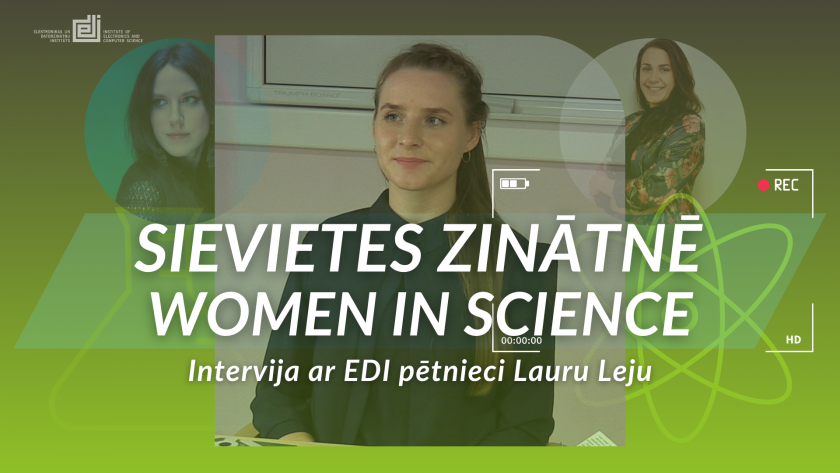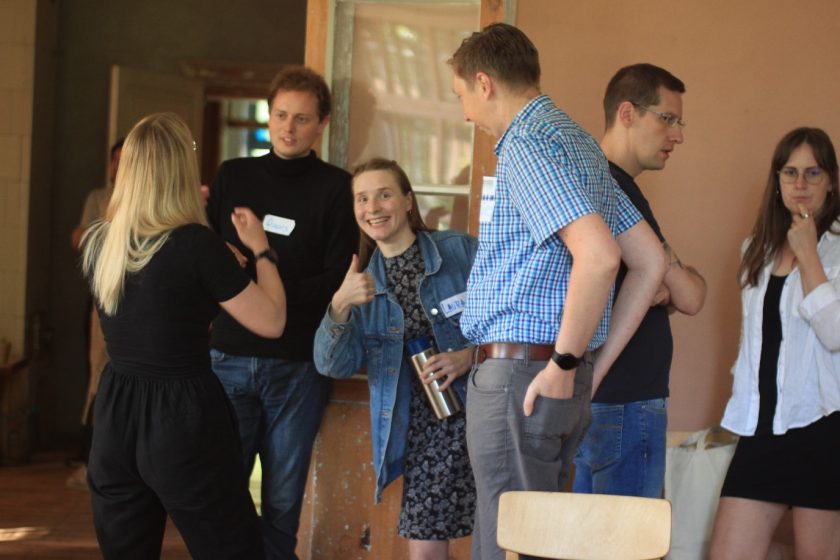
One of the goals of the Gender Equality Commission is to promote women’s involvement in science, so we are publishing a series of stories about women’s experiences. This story, the third in this series, is about Laura Leja, a researcher working in the Robotics and Machine Vision Laboratory at the Institute of Electronics and Computer Science, focusing on neural networks and differentiated physics.
Please tell us about yourself!
I studied mathematics at bachelor, master and now PhD level.
As mathematics is the basis for many sciences and industries, my fellow students are in finance, data analytics, logistics. One of my classmates, with whom I entered my PhD, is working in science at the University of Latvia.
What attracted you to this field at school?
I liked the sciences – math, chemistry, physics – at school. I knew straight away that I would study mathematics. I didn’t even know what I could do next, but I knew it would definitely be good for me and I love it.
How did you get into science?
I remember an acquaintance who was already working at the EDI told me to come and work here. But I was a bit scared and it seemed so serious. It took a year and I sent in my application and CV, I was accepted and I am very proud to be here. I have been working at EDI for almost three years. And yes, I really like it.
Do you feel that there are not enough women in the EDI team?
A while ago I was the only woman on the whole floor, then I felt it and I missed it more. But nowadays, I guess it’s a time when women are more interested in science or AI development, so there are more women now. And that makes me really happy.
Have you represented EDI at any events?
Yes, the last ones I participated in were the Business Technology Fair “Riga Comm” in Ķīpsala (Riga), the “European Big Data Value Forum” in the Czech Republic and the International Workshop on Embedded Digital Intelligence IWoEDI’2023 organised by EDI, where I was also involved in organising.
How do you feel at EDI? Are you valued here?
Yes, I definitely feel valued here! The staff is always nice and supportive.
Share your most interesting or funny moment at EDI!
Funny little moments happen every day, but the most interesting one I can think of is my colleague Alexander’s tour of the EDI before I started working here. It made a really big impression on me. I was fascinated by the self-driving cars, the wearable devices, the robotic arm and how EDI works with artificial intelligence. I was really fascinated by it all and I was ready for science.
Does EDI celebrate 8 March?
Actually, it was Covid-19 time and there were no events then, but this year they celebrated 8 March here. Colleagues were very nice to congratulate us, they prepared different performances, they sang and played musical instruments – it was very sweet.
Glass ceilings are a common term. Is it harder to be a woman in science than a man?
I think that, first of all, a woman can bring her own perspective to a problem in different fields, and that can lead to different kinds of good research results and solutions. The second aspect is that women can add their workforce to sectors such as electronics and computer science where there is a shortage of workers. Similarly, in male-dominated teams, women give a dynamic environment, it becomes more positive. The routines that women put in place are also emerging.
Of course, a woman has to bring up the children and look after the family, which is one aspect of why men might be more ambitious and go further. In Latvia, too, there are now more men in senior jobs.
We should look at competences, and if they are equal, then gender would be irrelevant.

What is your dream or goal in science?
I think science is a process. The main thing I would like is to have a sense of satisfaction from my scientific achievements. It doesn’t even matter the goals – as long as I have the satisfaction of having worked hard and achieved something that I really like. That would definitely be neural networks related to mathematics and differential equations from my studies. It could also be something very related to my current ROLIS project, which is about differentiable physics.
The feeling that I have done something that may not have been discovered in the world yet, even a little bit, is what gives me a sense of satisfaction and is why I want to continue in science.
Who are your role models in life and academic work?
My role models in academic work are more my colleagues from the University of Latvia, in whom I see a set of qualities that are very useful for scientists in particular, which are specific skills. For example, I could learn from many of them how to write good papers, how to manage a project and a team, how to do other things. I don’t have one person in particular, but I suppose I could learn a lot from colleagues, lecturers and other people at the University of Latvia. Every colleague I come into contact with in science contributes to my future development in science.
But in my private life it is more about my family and the values I have set for myself. Not a specific person, but what I would like to achieve myself.
What would you wish for girls who are still thinking about what to do after school?
I would definitely wish girls not to be afraid and to accept challenges. This could be something like Shadowing Day, In Students’ Shoes, any other courses during school or studies. Because it gives you a chance to be in that environment, to see if you really like it. Here at EDI there are also internships, courses where you can come and see if science is what you are interested in. In any case, if the science is close to you, I would definitely recommend studying mathematics, physics, computer science.
What have you learned recently?
That you shouldn’t be in a hurry. I don’t know if this is the most interesting thing, but I tend to rush things because I want to do it faster, thinking that it will be better, but sometimes in the end it just takes longer if I rush.
Interviewed by Sanda Roze.
